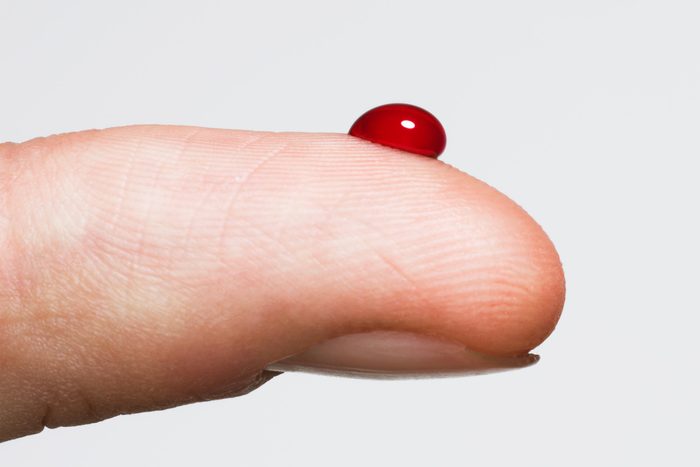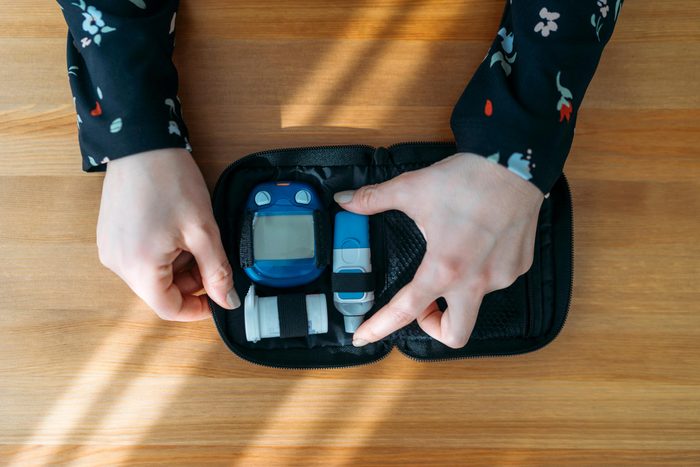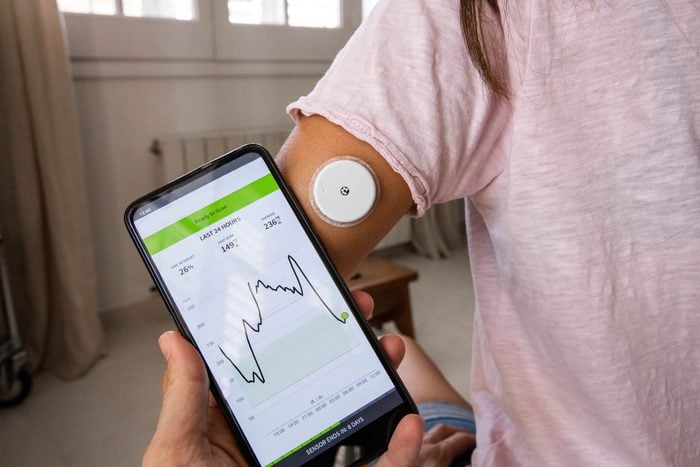
Research published in the Journal of the American College of Cardiology estimates that 63% of Americans have less-than-optimal blood sugar health—up from about 40% of Americans in 2010. This rapidly worsening trend spells bad news for our general metabolic health, a measure of a person’s risk factor for chronic conditions like diabetes and heart disease.
“Our cells depend on this sugar source as their main energy source for bodily processes,” explains Laura Purdy, MD, MBA, a family medicine physician licensed in all 50 states. But it’s a delicate balance. Too much sugar can overwork your body’s systems, resulting in cell, nerve, and organ damage. Too little sugar, and your body can’t power its normal functions. In both cases, unmanaged blood sugar puts your physiology under serious stress—and if that stress sustains, it can contribute to the development of chronic disease over time.
That’s why doctors say it’s important to recognize the signs of high blood sugar or low blood sugar—and if you experience persistent symptoms, to check in with your doctor for a personalized evaluation. “Regular monitoring, treatment options, and lifestyle modifications can all play a part in maintaining stable levels, supporting your overall health and well-being,” Dr. Purdy says. What works best for you can depend on your body’s needs.
24 Life-Saving Facts About Glucose Even People Without Diabetes Should Know

How high blood sugar affects your body
When your blood sugar gets too high, your body works to remove the excess sugar—and this can result in a range of symptoms, explains Eric Tam, MD, a primary care physician in California. Long-term, this can lead to heart disease, kidney disease, nerve damage, and vision problems, according to the American Diabetes Association (ADA).
In general, you can lower high blood sugar by eating well-balanced meals, drinking enough water, and exercising regularly, says Kajal Shah, MD, a board-certified endocrinologist at Texas Diabetes and Endocrinology.

1. You have to urinate more
When your blood sugar levels are high, your kidneys try to get rid of the glucose by excreting it in the urine, Dr. Tam says. Your body needs to then pull more water from tissues to get the excess sugar out. This regulatory process has a few knock-on effects: You’ll need to pee more, you’ll feel thirsty, and your skin and mouth may feel extra dry.
Here’s How Many Times You Should Actually Pee in a Day, a Urologist Reveals

2. More infections
“Increased blood sugar creates an optimal environment for bacteria and other pathogens to grow,” Dr. Tam says. That’s why consistently high blood sugar can make you more susceptible to infections, particularly urinary tract infections, yeast infections, and skin infections.
People with high blood sugar may also experience slower wound healing than normal, Dr. Purdy adds.
The #1 Worst Food to Eat if You’re Prone to Yeast Infections

3. Blurry vision
As your body pulls water from tissues to get rid of excess sugar in your blood, fluid levels can change in your eyes, according to the National Institute of Diabetes and Digestive and Kidney Diseases (NIDDK). This can cause tissue swelling that makes it harder for your eyes to focus and blur your vision.

4. Fatigue
Lethargy, fatigue, and irritability are some of the most common symptoms of high blood sugar, Dr. Tam says. Excess sugar in your blood impacts its circulation, so your cells body-wide might not get the oxygen and energy they need—making you feel more tired.
The dehydration and inflammation that result from high blood sugar can contribute to fatigue, too.

5. Trouble thinking clearly
High blood sugar levels can also lead to physiological changes in the brain that increase anxiety and affect cognitive function, leading to difficulty thinking clearly, poor memory, slower cognitive speed, and a lack of focus, says Linda Khosaba, NMD, FABNE, a board-certified naturopathic endocrinologist in Scottsdale, AZ.
If Your Attention Span Is Burnt Out, a Leading Scientist’s Simple Fix Will Come as Relief

How low blood sugar affects your body
“Having low blood sugar is actually more dangerous than having elevated blood sugar,” Dr. Tam says. “When our blood sugar becomes too low, the brain and other essential organs are not getting the fuel and energy they need.” And low blood sugar doesn’t always cause symptoms. If it’s frequently low, your body can adapt and get used to it—creating a potentially dangerous situation.
Low blood sugar is most common in people with diabetes, Dr. Shah explains. “It usually occurs due to medications that increase the insulin levels in the body and the defective counter regulatory hormones that prevent hypoglycemia.” But undereating, skipping meals, and some medical conditions can cause low blood sugar as well.
“If your blood sugars are low, they can be managed by well-balanced meals, eating at short, frequent intervals, and limiting overconsumption of carbohydrates,” Dr. Shah says. “For people with diabetes, the risk of low blood sugar can be reduced by checking finger stick glucose at regular intervals, especially before meals and bedtime.”
15 Things Diabetes Doctors Do to Keep Their Own Blood Sugar Under Control

6. Brain fog
“The brain is extremely sensitive to low blood sugar, and when it does not get the fuel it needs, you can begin to experience symptoms of confusion, blurred vision, headache, dizziness, or lightheadedness,” Dr. Tam says.

7. Rapid heartbeat
Low blood sugar also triggers your body’s fight-or-flight stress response, Dr. Tam says. Hormones like epinephrine get released, causing symptoms like a rapid or irregular heartbeat, shakiness, tremors, and sweating. (Though if low blood sugar happens too frequently, your body may stop releasing these hormones—a situation called “hypoglycemia unawareness.”)

8. Anxiety
The fight-or-flight hormones released in your body can also contribute to feelings of nervousness, restlessness, and anxiety. Dr. Purdy says you might experience mood swings, irritability, weakness, and drowsiness.
In severe cases, loss of consciousness or seizures can occur, which require immediate medical treatment.

9. Sleep problems
Low blood sugar can interfere with your sleep, too. According to the NIDDK, experiencing low blood sugar overnight can reduce sleep quality—so you feel tired and irritable after waking up—as well as trigger nightmares and heavy sweating.
Stay well with The Healthy @Reader’s Digest newsletter and follow The Healthy on Facebook, Instagram, and Twitter. Keep reading:

